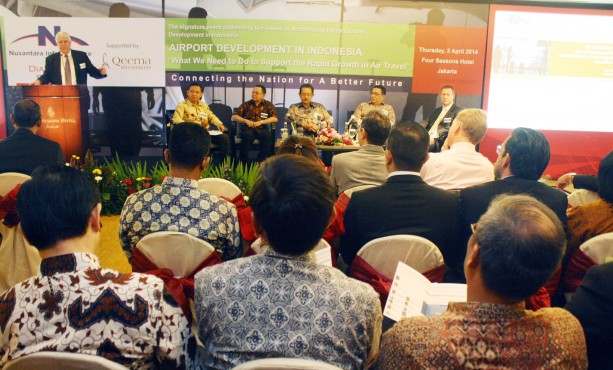Nusantara Infrastructure and Stakeholders Facilitated Dialogue Series VIII to Overcome The Airports Problems
All Angkasa Pura airports have seen an overcapacity, in line with the rising growth of passengers to reach 20% annually.
03 April 2014
Author: Administrator
Air traffic is no exception. The Ministry of Transportation has recorded tremendously high demand for air travel, causing airports in the country to endure considerable pressure. Thus, on average, all airports operated by Angkasa Pura I and Angkasa Pura II suffer from overcapacity.
Today, Indonesia has about 22 airlines operating commercial aircraft and 35 airlines operating chartered aircraft. All airlines serve approximately 400 domestic and international flight routes connecting 121 cities in Indonesia and 21 countries.
"Issues surrounding airport infrastructure in Indonesia have become one of the most pressing problems faced by all stakeholders related to transportation and inter-region connectivity. Therefore, we need a platform to facilitate in-depth discussions to identify the challenges, opportunities and find the right solutions that need to be applied immediately," said Conference Leader of the Dialogue Series VIII and PT Nusantara Infrastructure Tbk Director John Scott Younger, in a Press Conference held during the Dialogue Series VIII at the Four Seasons Hotel, Jakarta on Thursday (3/4).
For instance, the Soekarno-Hatta airport, which is operated by PT Angkasa Pura II, has suffered overcapacity since 2003. At the time, the number of passengers had already reached 19.7 million passengers per year, while the maximum capacity was at 18 million passengers. At the end of 2013, the number of passenger movement reached 62.1 million, up 3.5% from as many as 60 million in 2012.
Based on the Airport Council International (ACI) data, which indicateda figure of 62.1 million passengers, Soekarno-Hatta International Airport was listed as the eighth busiest airport in the world in 2013. It moved up from its ninth position on the list the previous year, and only ranked by 22nd in 2009.
PT Angkasa Pura II Corporate Secretary Daryanti said that based on the ACI rankings, the Soekarno-Hatta Airport was also ranked the fourth busiest airport in the Asia-Pacific region after Beijing Capital International Airport, Haneda International Airport in Tokyo and Dubai International Airport.
"This staggering position of Soekarno-Hatta International Airport ranking eighth in the world and fourth in Asia-Pacific indicates a significant airlines industry growth in Indonesia. The average national industry growth has reached 2.5 times the economic growth," said Daryanto (as quoted from sindonews.com, Thursday, February 20, 2014).
The significant growth in the number of passengers has prompted airline companies rushing to introduce new aircraft. Garuda Indonesia for example, plans to add 27 new aircraft in 2014, allowing the company to have a total fleet of 166 aircraft by December 2014.
Deputy Minister of Transportation Bambang Susantono said that with a population of approximately 240 million people, coupled with 83.7 million domestic and international flights, Indonesia has become one of the biggest aviation markets with one of the highest air traffic growth rates in the world. According to a McKinsey & Co. study, Indonesia will be the seventh biggest economy in the world by 2030 that will generate 90 million new consumers ready to travel.
"We have noted that the growth of domestic air passengers grew by an average of 13.8% per year (between 2009 and 2013), along with 19.3% in international flights for the same period. In other words, our airline industry grew by 14%-20% annually. When the global air transportation grew by 5% per annum or double for every 15 years, air flights in Indonesia increased by twofold for every 10 years," said Bambang (as quoted on the official website of the Ministry of Transportation).
General Manager Corporate Affairs of Nusantara Infrastructure Deden Rochmawaty said that as one of the infrastructure private company, PT Nusantara Infrastructure Tbk called upon to facilitate a forum focusing on issues of Indonesia’s infrastructure. It is with great hope that this dialogue forum attended by various industry players and all stakeholders in the airport sector can provide positive solutions to provide feasible recommendations to address the urgent problem of the airport.
Several countries have also been working on major airport development. South Korea, for example, continues to expand the Incheon Airport despite having been bestowed the Best Airport Award in terms of service quality for nine consecutive years until 2013 by the Airports Council International (ACI).
The official website of Incheon Airport mentioned that it will begin its third phase of construction to boost passenger capacity to 62 million people. Incheon also plans to expand itself as a global airport mega hub following the completion of its terminal 2 construction. The capacity expansion is expected to be completed prior to the Pyeongchang Olympics in 2018. As of late 2013, Incheon airport has the capacity to accommodate 41.48 million passengers with 271,224 aircraft movements.
About Dialogue Series
The Dialogue Series is an open forum held regularly to facilitate the exchange of ideas between all stakeholders in the infrastructure sectors as well as professionals from home and abroad in an effort to find the best solution to issues surrounding infrastructure.
In continuing the success of the Dialogue Series I to VII, the Dialogue Series VIII will be held to facilitate the government and private sectors to address the issues related to airport capacity in Indonesia. The Dialogue Series is thus a good platform to share knowledge and experiences between successful key industry players and technology providers from abroad.
More than 120 representatives of stakeholders in the air transport sector will attend the Dialogue Series VIII. They come from diverse sectors, including the Ministry of Transport, local government, airport service management, financing companies as well as airline companies in Indonesia. This forum aims to seek innovative solutions to address the pressing issues in the air transportation sector.